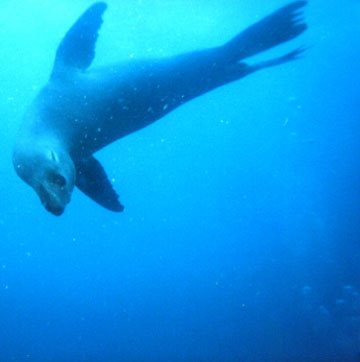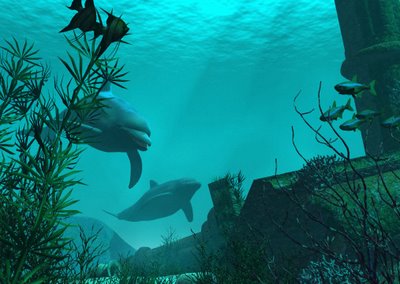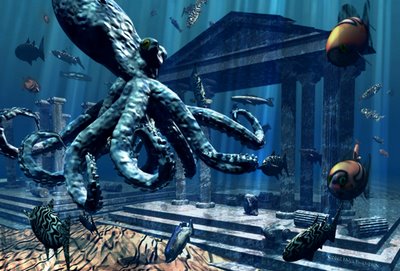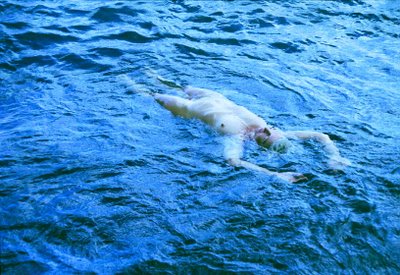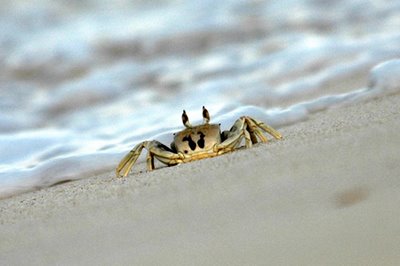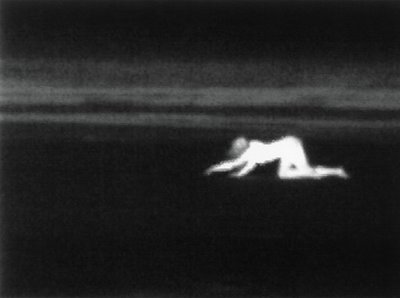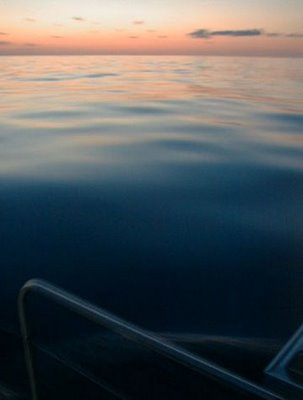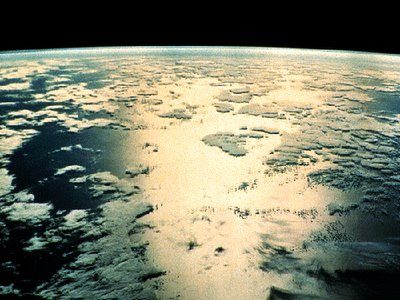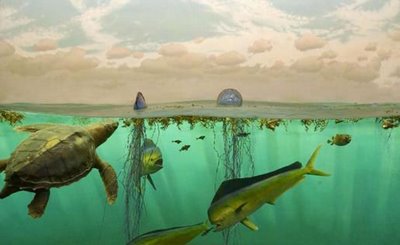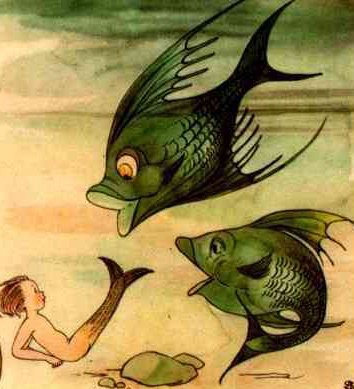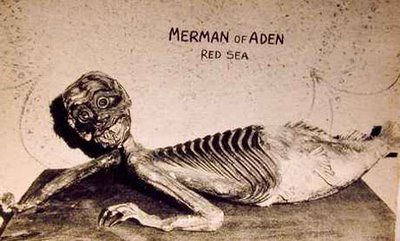 Saturday
SaturdayA brilliant, hard blue afternoon in bone-dry Florida, spiritually virulent, omnipotent, the air suffused with the final breath of the Christ on the cross, sighing “it is finished,”
consummatum est ...
An emotionally torn day, my father-in-law taking a turn for the worse a couple nights ago in the stroke recovery ward of the hospital, my wife in agony, aggrieved, angry, full of black angst, unarguably spent, sensing only her life’s ruins, back turned to me too late at night, refusing everything my heart has led me to offer ...
Perhaps it’s temporary. She’s at the hospital now, may spend the night there keeping watch as much on him as the half-assed nurses who may have botched his care.
(
May is important here, because that family suffers the worst form of consumer outrage at times, suspecting everything -- from hospital staffers up to God Himself -- in some form of fraud, a complicity against life & love & good people.)
So the windows are shut and the a/c’s suffising the house with a calm stasis, and Bill Evans’ last platter “I Will Say Goodbye” spins bittersweetly on the stereo, a passion of deep beauty ...
Whose passion? In the Gospel of Thomas, Jesus says, “Let the one who seeks not stop seeking til he finds. When he finds, he will become troubled. When he becomes troubled, he will be astonished.” Is that the inward harrow, a road which leads through skulls to paradise, an ever-newly created one, at that?
***
Always such suffering and grief in the most gorgeous music, a cathedral bittersweetness: Temple of Eros, perhaps, whose embrace crushes the heart’s bursting grapes and swoons down into the the distillate dark for a season. According to Carl Kerenyi in
Dionysos, Archetypal Image of Indestructible Nature,, “The oldest idol of Dionysos known to Athenian tradition was a phallus set up in the templ of the Horai, but the identity disclosed in the epithet ‘orthos,’ ‘he who stands erect,’ was intentionally veiled by the explanation that the right mixture of wine and water enabled men to stand upright.” The god depends on stout draughts of bittersweetly-seasoned ale, His fructive honeyed words distilled in gall.
Rilke writes in a letter in 1923,
***
More and more in my life and in my work I am guided by the effort to correct our old repressions, which have removed and gradually estranged us from the mysteries out of whose abundance our lives might become truly infinite. It is true that these mysteries are dreadful, and people have always drawn away from them.
But where can we find anything sweet and glorious that would never wear this mask, the mask of the dreadful? Life -- and we know nothing else --, isn't life itself dreadful? But as soon as we acknowledge its dreadfulness (not as opponents; what kind of match could we be for it?), but somehow with a confidence that this very dreadfulness may be something completely ours, though something that is just now too great, too vast, to incomprehensible for our learning hearts --: as soon as we accept life's most terrifying dreadfulness, at the risk of perishing from it (i.e. from our own Too-much!) --: then an intuition of blessedness will open up for us and, at this cost, will be ours.
Whoever does not, sometime or other, give his full consent, his full and JOYOUS consent, to the dreadfulness of life, can never take possession of the unutterable abundance and power of our existence; can only walk on its edge, and one day, when the judgment is given, will have been neither alive nor dead. To show the IDENTITY of dreadfulness and bliss these two face on the same divine head, indeed this one SINGLE face, which just presents itself this way or that, according to our distance from it or the state of mind in which we perceive it--: this is the true significance and purpose of the Elegies and the Sonnets to Orpheus.
(transl Jane Bannard Greene and M.D. Herter Norton)***
It’s the Saturday before Easter and I’m far at sea, far down under it, wet like never before, feeling kin to those animals for whom salt in the blood was not enough. Rachel Carson here in
The Sea Around Us:
Some of the land animals returned to the ocean. After perhaps 50 million years of land life, a number of reptiles entered the sea in Mesozoic time. They were huge and formidable creatures. Some had oarlike limbs by which they roved through the water; some were web-footed, with long, serpentine necks. These grotesque monsters disappeared millions of years ago, but we remember them when we come upon a large sea turtle swimming many miles at sea, its barnacle-encrusted shell eloquent of its marine life. Much later, perhaps no more than 50 million years ago, some of the mammals, too, abandoned a land life for the ocean. Their descendants are the sea lions, seals, sea elephants and whales of today. (p. 14)
***
I yearn back to sea, for its salt breadth and iniquity, its ever-changing changelessness, its deep pelvic tide: My words are all wet, drowned of dry purpose, lost: Consider this the gospel writ at the book at the bottom of the sea, the one the first whale-rider found at the bottom of Melville’s mythic sea ... both father and source:
“When Bramha, or the God of Gods, saith the Shaster, resolved to recreate the world after one of its periodic dissolutions, he gave birth to Vishnoo, to preside over the work; but the Vedas, or mystical books, whose perusal would seem to have been indispensible to Vishnoo before beginning the creation, and which must have contained something in the shape of practical hints to young architects, these Vedas were lying at the bottom of the waters; so Vishnoo became incarnate as a whale, and sending down to the uttermost depths, rescued the sacred volumes. Was not this Vishnoo a whalemen, then? ever as a man rides a horse is called a horseman?” (“The Honor and Glory of Whaling”)
 DARK DANCEREasily written loose-fingered words!
DARK DANCEREasily written loose-fingered words!
I feel the thrum of their climax and close.-- Walt Whitman
Why is it, dark god, that when
The hour is so grim and sad
That You are most tumescent,
Ruddy and slick and laughing?
Does the sickleman walk
Closest to you on the parade
To darkest doors, the one
Who closes them innate within
Your clasping cry? And why
Is the song so male? My wife
Receives your smile only
When the hour’s perfect
Once or twice in the life.
While I find at the worst of
Times you’re dancing with
The Master around a greedy pole,
Ecstatic to mount and die
Exactly where no wings can fly.
***
FROM UNDERNEATHSteven Dunn
A giant sea turtle saved the life
of a 52 year old woman lost at sea
for two days after a shipwreck
in the Southern Philippines. She rode
on the turtle’s back.—Syracuse Post-Standard
When her arms were no longer
strong enough to tread water
it came up beneath her, hard
and immense, and she thought
this is how death comes,
something large between your legs
and then the plunge.
She dived off instinctively,
but it got beneath her again
and when she realized what it was
she soiled herself, held on.
God would have sent something winged,
she thought. This came from beneath,
a piece of hell that killed a turtle
on the way and took its shape.
How many hours passed?
She didn’t know, but it was night
and the waves were higher. The
thing swam easily in the dark.
She swooned into sleep.
When she woke it was morning,
the sea calm, her strange raft
still moving. She noticed the elaborate
pattern of its shell, map-like,
the leathery neck and head
as if she’d come up behind
an old longshoreman
in a hard-backed chair.
She wanted and was afraid to touch
the head—one finger
just above the eyes—
the way she could touch her cat
and make it hers.
The more it swam a steady course
the more she spoke to it
the jibberish of the lost.
And then the laughter
located at the bottom
of oneself, unstoppable.
The call went from sailor to sailor
on the fishing boat: A woman
riding an “oil drum”
off the starboard side.
But the turtle was already swimming
toward the prow
with its hysterical, foreign cargo
and when it came up alongside
it stopped until she could be hoisted off.
Then it circled three times
and went down.
The woman was beyond all language
the captain reported;
the crew was afraid of her
for a long, long time.
***
TALES OF SEAL-MENFrom
Iona,
The Works of Fiona Macleod Volume IV
Elsewhere I have told how a good man of Iona sailed along the coast one Sabbath afternoon with the Holy Book, and put the Word upon the seals of Soa: and, in another tale, how a lonely man fought with a sea-woman that was a seal: as, again, how two fishermen strove with the sea-witch of Earraid: and, in "The Dan-nan-Ron," of a man who went mad with the sea-madness, because of the seal-blood that was in his veins, he being a MacOdrum of Uist, and one of the Sliochd nan Ron, the Tribe of the Seal. And those who have read the tale, twice printed, once as "The Annir Choille," and again as "Cathal of the Woods," will remember how, at the end, the good hermit Molios, when near death in his sea-cave of Arran, called the seals to come out of the wave and listen to him, so that he might tell them the white story of Christ; and how in the moonshine, with the flowing tide stealing from his feet to his knees, the old saint preached the gospel of love, while the seals crouched upon the rocks, with their brown eyes filled with glad tears: and how, before his death at dawn, he was comforted by hearing them splashing to and fro in the moon-dazzle, and calling one to the other, "We, too, are of the sons of God."
What has so often been written about is a reflection of what is in the mind: and though stories of the seals may be heard from the Rhinns of Islay to the Seven Hunters (and I first heard that of the MacOdrums, the seal-folk, from a Uist man), I think, that it was because of what I heard of the sea-people on Iona, when I was a child, that they have been so much with me in remembrance.
In the short tale of the Moon-child, I told how two seals that had been wronged by a curse which had been put upon them by Columba, forgave the saint. and gave him a sore-won peace. I recall another (unpublished) tale, where a seal called Domnhuil Dhu--a name of evil omen--was heard laughing one Hallowe'en on the rocks below the ruined abbey, and calling to the creatures of the sea that God was dead: and how the man who heard him laughed, and was therewith stricken with paralysis, and so fell sidelong from the rocks into the deep wave, and was afterwards found beaten as with hammers and shredded as with sharp fangs.
But, as most characteristic, I would rather tell here the story of Black Angus, though the longer tale of which it forms a part has been printed before.
One night, a dark rainy night it was, with an uplift wind battering as with the palms of savage hands the heavy clouds that hid the moon, I went to the cottage near Spanish Port, where my friend Ivor Maclean lived with his old deaf mother. He had reluctantly promised to tell me the legend of Black Angus, a request he had ignored in a sullen silence when he and Padruic Macrae and I were on the Sound that day. No tales of the kind should be told upon the water.
When I entered, he was sitting before the flaming coal-fire; for on Iona now, by decree of MacCailein Mòr, there is no more peat burned.
"You will tell me now, Ivor?" was all I said.
"Yes; I will be telling you now. And the reason why I never told you before was because it is not a wise or a good thing to tell ancient stories about the sea while still on the running wave. Macrae should not have done that thing. It may be we shall suffer for it when next we go out with the nets. We were to go to-night; but, no, not I, no, no, for sure, not for all the herring in the Sound."
"Is it an ancient sgeul, Ivor?"
"Ay. I am not for knowing the age of these things. It may be as old as the days of the Féinn, for all I know. It has come down to us. Alasdair MacAlasdair of Tiree, him that used to boast of having all the stories of Colum and Brigdhe, it was he told it to the mother of my mother, and she, to me."
"What is it called?"
"Well, this and that; but there is no harm in saying it is called the Dark Nameless One."
"The Dark Nameless One!
"It is this way. But will you ever have heard of the MacOdrums of Uist?
"Ay; the Sliochd-nan-ròn.
"That is so. God knows. The Sliochd nan-ròn . . . the progeny of the Seal. . . . Well, well , no man knows what moves in the shadow of life. And now I will be telling you that old ancient tale, as it was given to me by the mother of my mother."
On a day of the days, Colum was walking alone by the sea-shore. The monks were at the hoe or the spade, and some milking the kye, and some at the fishing. They say it was on the first day of the Faoilleach Geamhraidh, the day that is called Am Fhéill Brighde, and that they call Candlemas over yonder.
The holy man had wandered on to where the rocks are, opposite to Soa. He was praying and praying; and it is said that whenever he prayed aloud, the barren egg in the nest would quicken, and the blighted bud unfold, and the butterfly break its shroud.
Of a sudden he came upon a great black seal, lying silent on the rocks, with wicked eyes.
"My blessing upon you, O Ròn," he said, with the good kind courteousness that was his. "Droch spadadh ort," answered the seal, "A bad end to you, Colum of the Gown."
"Sure now," said Colum angrily, "I am knowing by that curse that you are no friend of Christ, but of the evil pagan faith out of the north. For here I am known ever as Colum the White, or as Colum the Saint; and it is only the Picts and the wanton Normen who deride me because of the holy white robe I wear."
"Well, well," replied the seal, speaking the good Gaelic as though it were the tongue of the deep sea, as God knows it may be for all you, I, or the blind wind can say; "well, well, let that thing be: it's a wave-way here or a wave-way there. But now, if it is a druid you are, whether of fire or of Christ, be telling me where my woman is, and where my little daughter."
At this, Colum looked at him for a long while. Then he knew.
"It is a man you were once, O ROn?"
"Maybe ay and maybe no."
"And with that thick Gaelic that you have, it will be out of the north isles you come?"
"That is a true thing."
"Now I am for knowing at last who and what you are. You are one of the race of Odrum the Pagan?"
"Well, I am not denying it, Colum. And what is more, I am Angus MacOdrum, Aonghas mac Torcall mhic Odrum, and the name I am known by is Black Angus."
"A fitting name too," said Colum the Holy, "because of the black sin in your heart, and the black end God has in store for you."
At that Black Angus laughed.
"Why is the laughter upon you, Man-Seal?"
"Well, it is because of the good company I'll be having. But, now, give me the word: Are you for having seen or heard of a woman called Kirsteen M'Vurich?"
"Kirsteen--Kirsteen--that is the good name of a nun it is, and no sea-wanton!"
"O, a name here or a name there s soft sand. And so you cannot be for telling me where my woman is?"
"No."
"Then a stake for your belly, and nails through your hands, thirst on your tongue, and the corbies at your eyne!"
And, with that, Black Angus louped into the green water, and the hoarse wild laugh of him sprang into the air and fell dead upon the shore like a wind-spent mew.
Colum went slowly back to the brethren, brooding deep. "God is good," he said in a low voice, again and again; and each time that he spoke there came a daisy into the grass, or a bird rose, with song to it for the first time, wonderful and sweet to hear.
As he drew near to the House of God he met Murtagh, an old monk of the ancient race of the isles.
"Who is Kirsteen M'Vurich, Murtagh?" he asked.
"She was a good servant of Christ, she was, in the south isles, O Colum, till Black Angus won her to the sea."
And when was that?"
"Nigh upon a thousand years ago."
"But can mortal sin live as long as that?"
"Ay, it endureth. Long, long ago, before Oisin sang, before Fionn, before Cuchullin, was a glorious great prince, and in the days when the Tuatha-de-Danann were sole lords in all green Banba, Black Angus made the woman Kirsteen M'Vurich leave the place of prayer and go down to the sea-sbore, and there he leaped upon her and made her his prey, and she followed him into the sea."
"And is death above her now?"
"No. She is the woman that weaves the sea-spells at the wild place out yonder that is known as Earraid: she that is called the seawitch."
"Then why was Black Angus for the seeking her here and the seeking her there?"
"It is the Doom. It is Adam's first wife she is, that sea-witch over there, where the foam is ever in the sharp fangs of the rocks."
"And who will he be?"
His body is the body of Angus, the son of Torcall of the race of Odrum, for all that a seal be is to the seeming; but the soul of him is Judas."
"Black Judas, Murtagh?"
"Ay, Black Judas, Colum."
But with that, Ivor Macrae rose abruptly from before the fire, saying that he would speak no more that night. And truly enough there was a wild, lone, desolate cry in the wind, and a slapping of the waves one upon the other with an eerie laughing sound, and the screaming of a seamew that was like a human thing.
So I touched the shawl of his mother, who looked up with startled eyes and said, "God be with us"; and then I opened the door, and the salt smell of the wrack was in my nostrils, and the great drowning blackness of the night.
 Easter Sunday
Easter SundayDeep still night, as ever, again: cool breezes rake the dry verdure, a late full moon casting the fascia of darkness in pale bronze. The Tomb door opens -- as it does, every day, every departure here -- and though I can’t hear the Feet approach, there is a sense of readiness in the hour. All is cast for the god’s brute clapper, announcing if not resurrection or a good erection, the next selection, the next chambered Bride, the next shore ...
***
Wherever the currents meet, especially if they differ sharply in temperature or salinity, therer are zones of great turbulence and unrest, with water sinking or rising up from the depths and with shifting eddies and foam lines on the surface. At such places the richness and abundance of marine life reveals itself most strikingly.
-- Rachel Carson,
The Sea Around Us***
(In the gnostic
Gospel of Philip) Philip says that many people, whome he calls “the apostles and the apostolic ones” are “in error,” since they remain oblivious of -- even offended by -- this mystery (of spiritual rebirth). Such people, he continues, are also wrong about resurrection, since they take this, too, as if it could be only a unique event in which Christ died and rose bodiliy from the grave. Philip suggests instead that Jesus’ resurrection, like his virgin birth, is no only something that occurred in the past but is a paradigm of what happens to each person who undergoes a spiritual transformation.
...
Whoever undergoes such a transformation, he says, “is no longer a Christian, but a Christ.”
-- Gospel of Philip p57:26-27, in Pagels,
Beyond Belief: The Secret Gospel of Thomas***
BLUE ARKThe Great Flood became a
History of fresh-sinned worlds,
The emptied ark a skull for
Cathedrally lost innocence.
Judgment now is pounded on
A water cross, & harrowed by
Upwellings of blue radiance.
I live where mystery rims the
Tide with deeper surges than
Mere words reveal, a a marginal
Tumescent wood alive
With night and sea and lunar
Eyes: A Christian world
No more, nor one strummed by
The lover’s harp, nor modern
In the screwy sense of gears,
But a Christ of wet descending lanes
Aboard an ark of wildest names.
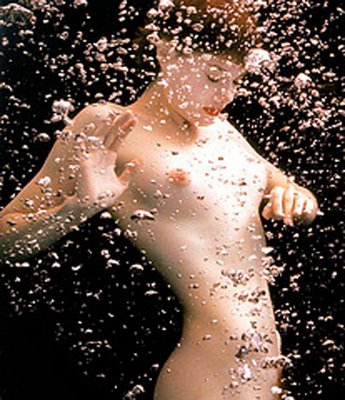 MondayPROMENADE
MondayPROMENADEIt’s not easy, sitting here at 4 a.m.
When I could as well be sleeping
Sheeted next to my wife: But You
Have nailed me here with jolts of
Faith or jones or desire, bidding
Me bathe my verbs again in
Blue salt and diving fire. My
Eyes close reading Whitman
And I drowse, finding myself
Upon a hard-baked promenade
That is covered with skeins of web,
A white sprawled beach of it
With no sea in sight though
I know the ocean lies ahead. I
dream the driest augment of
This hour, truth in naked brilliance,
Desperate for something to soak and swim
This blue mind’s finned aortas in.
***
Desperate for the sea’s: strangeness, its intractably heaving loins of surf; for its evers and alls, its preternatural calm of blue thrall. In “The Story of the Siren” by E.M. Forster an Greek local relates to an English tourist (the baedekkering perambling Author) how only good people can survive the Siren’s song; only they can hear it without drowning in some quintessential way. “The priests have blessed the air,” he says, “so she cannot breathe it, and blessed the rocks, so that she cannot sit on them. But the sea no man can bless, because it is too big, and always changing. So she lives in the sea.” He tells of how his brother dove into the sea after wronging him and sees the Siren, engaging the sea’s disastrous fate. The man is down under too long, and when he at last is hauled into the boat, “he was so large he seemed to fill it, and so wet that we could not dress him. I have never seen a man so wet.” Although a priest tries to rescue the man’s soul by sprinkling him with holy water, “it was no good. He was too big -- like a piece of the sea. He kissed the thumb-bones of San Biagio and they never dried til evening.”
That sort of going-back-to-sea, that sort of seal-singing, that sort of abyssal wetness of the mind which hearts a greater home than any dry hour, though each is sufficient portal.
***
A BRIEF FOR THE DEFENSEJack Gilbert
from
Refusing HeavenSorrow everywhere. Slaughter everywhere. If babies
are not starving someplace, they are starving
somewhere else. With flies in their nostrils.
But we enjoy our lives becuase that’s what God wants.
Otherwise the mornings before summer dawn would not
be made so fine. The Bengla tiger would not
be fashioned so miraculously well. The poor women
at the fountain are laughing together between
the suffering they have known and the awfulness
in their future, smiling and laughing while somebody
in the village is very sick. There is laugter
every day in the terrible streets of Calcutta,
and the women laugh in the cages of Bombay.
If we deny our happiness, resist our satisfaction,
we lessen the importance of their deprivation.
We must risk delight. We can do without pleasure,
but not delight. Not enjoyment. We must have
the stubbornness to accept our gladness in teh ruthless
furnace of the world. To make injustice the only
measure of our attention is to praise the Devil.
If the locomotive of the Lord runs us down,
we should give thanks that the end had magnitude.
We must admit there will be music despite everything.
We stand at the prow again of a small ship
anchored late at night in the tiny port
looking over the sleeping island: the waterfront
is three shuttered cafes and one naked light burning.
To hear the faint sound of oars in the silence as a rowboat
comes slowly out and then goes back is truly worth
all the years of sorrow that are to come.
***
SONNET TO ORPHEUS 2.29Ranier Maria Rilke
transl. Stephen Mitchell
Silent friend of many distances, feel
how your breath enlarges all of space.
Let your presence ring out like a bell
into the night. What feeds upon your face
grows mighty from the nourishment thus offered.
Move through transformation, out and in.
What is the deepest loss you have suffered?
If drinking is bitter, change yourself to wine.
In this immeasurable darkness, be the power
that rounds your sense in their magic ring,
the sense of their mysterious encounter.
And if the earthly no longer knows your name,
whisper to the silent earth: I’m flowing.
To the flashing water say: I am.
